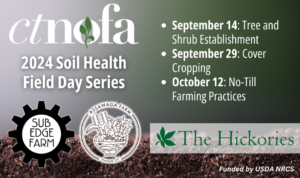Upcoming Grant Opportunities for Farmers
Farmers, check out this list of current grant funding opportunities, compiled courtesy of the Solid Ground Program at UConn Extension. They provide the following advice: Don’t try to fit yourself into a grant that doesn’t work for you. If you are unsure, reach out to the contact for the grant you are interested in to see if your application is likely to succed. They are specifically paid to help you all with those type of questions! Some of these grants also have recorded or upcoming webinars that will help you understand if you are eligible.
Northeast SARE Farmer Grant Program DUE by NOV 14th
Farmer Rancher Grants provide opportunities for farmers to solve problems on the farm using innovative sustainable agriculture practices. Projects can focus on research or education and demonstration. Grant requests can be up to $30,000 and projects must be completed within 3 years. A technical advisor is required and should be enlisted at the early stages of the proposal development.
Contact: Candice Huber at northeast-fr@sare.org
American Farmland Trust DUE by NOV 21st
The relevant grant to CT farmers is the up-to-$10,000 Regenerative Livestock Farming (RLF) grants for livestock farmers to cover the cost of equipment and inputs toward adopting regenerative, soil health practices (e.g., fencing, no-till equipment, cover crop seed, irrigation equipment, pollinator habitat, etc).
Contact: Kristin Irving kirvin@farmland.org
CT Grown for CT Kids Week Grant– DUE by DEC. 14th
microgrants allowed up to $5k to help you sell to schools AND other options available
Ideal for wash and pack stations, processing and sorting equipment, containers for transportation, season extension needs (tunnels, winter storage), as well as training costs in food safety. All of these investments should be tied to a plan to sell more products to school districts and/or early childhood providers.
Contact: Cyrena.Thibodeau@ct.gov
CT Department of Agriculture Farm Transition Grant- DUE by JAN 10
Grant with 4 categories that provides for the different needs farmers are facing.
New Farmer Micro Grants: Max award of $5000 with a 25% match. Example of eligible purchases-Production/processing equipment small buildings, greenhouses/hoop houses, irrigation, pasture fencing, other equipment purchases related to increasing production, websites and conducting marketing.
Infrastructure Investment Grant: up to $20,000 with 50% match. Examples of eligible expenses: Livestock/pasture fencing, barn remodeling/expansion, processing equipment, irrigation systems, tractor attachments,. All of these should be geared toward INCREASING production.
Research and Development Grant: up to $25,000 with 40% match. Examples of eligible expenses: Consultant fees, equipment to pilot a product/concept, expenses related to exploratory product development, in-store testing events to determine consumer viability.
Innovation and Diversification Grant: up to $49,999 with 50% match. Examples of eligible expenses: Expansion of product offerings including value-added processing equipment, equipment that will assist in diversification of farm products, construction of a farm store or processing facility, innovative technology or software, or marketing and outreach to promote the new product, service, or market.
Contact: Alison.Grabarz@ct.gov
New CT Farmers Alliance Climate Smart Ag and Forestry Grant- DUE by JAN 12th
Funding will be available in two tiers: 18 grants of up to $8,000 & 4 grants of up to $30,000. Farmers can apply for funding for climate smart agricultural or forestry practices. A resource list of practices is available here: NCTFA Climate Smart Practices. Your project does not have to be on this list. Application should include one or more climate smart practice
Contact: nctfaclimate@gmail.com or xochitl.ahtziri@gmail.com para español
Cityseed BIPOC Farmer Stipend Application– DUE by JAN. 15th
Farmers can request up to $5000 in funding.
Projects that directly relate to the success and longevity of a farming business and that promote the sales of CT Grown products will be prioritized. Examples of eligible expenses include: Professional Development- Online Courses, Literature, Conferences, Equipment- Harvest Tools, Vehicle, Tractor, Grow Lights, electric fencing Supplies- Seed Starting and Soil, Market Related, Seed Saving, Infrastructure- Raised beds, High Tunnel, Wash Station, Cooler
Contact: kaitlyn@cityseed.org
Recent Posts
CT NOFA Announces 2024 Slate of Soil Health Field Days
Beginning in late summer, CT NOFA will host three field days centered on soil health…
Read MoreCT NOFA Board Member, Freedom Gerardo, Featured on New Hampshire Public Radio
CT NOFA board member, Hector “Freedom” Gerardo, was recently featured on New Hampshire Public Radio’s…
Read More

